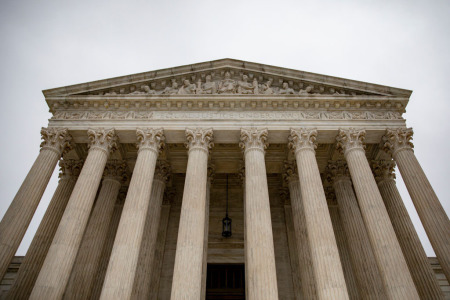Supreme Court rules that California can't force nonprofits to disclose private donors' names

The United States Supreme Court has ruled 6-3 that California cannot compel nonprofits to disclose their private donor information, reversing an earlier judgment against two conservative groups.
The high court released their opinion in the case of Americans for Prosperity Foundation v. Bonta, Attorney General of California on Thursday morning.
At issue was the yearslong effort of California’s attorney general to get the private donor lists of conservative groups, namely Americans for Prosperity and the Thomas More Law Center.
Chief Justice John Roberts delivered the majority opinion of the court, save for the section of Part II–B–1, with Justice Sonia Sotomayor authoring a dissent that Justices Elena Kagan and Stephen Breyer joined.
“We do not doubt that California has an important interest in preventing wrongdoing by charitable organizations,” read the majority opinion.
“There is a dramatic mismatch, however, between the interest that the Attorney General seeks to promote and the disclosure regime that he has implemented in service of that end.”
The majority opinion declared that “California is not free to enforce any disclosure regime that furthers its interests. It must instead demonstrate its need for universal production in light of any less intrusive alternatives.
“The disclosure requirement ‘creates an unnecessary risk of chilling’ in violation of the First Amendment … indiscriminately sweeping up the information of every major donor with reason to remain anonymous,” continued the majority.
“The petitioners here, for example, introduced evidence that they and their supporters have been subjected to bomb threats, protests, stalking, and physical violence.”
In her dissent, Sotomayor contented that the plaintiffs failed to show “an actual First Amendment burden before demanding that a law be narrowly tailored to the government’s interests.”
“Not so today. Today, the Court holds that reporting and disclosure requirements must be narrowly tailored even if a plaintiff demonstrates no burden at all,” wrote Sotomayor.
“Today’s analysis marks reporting and disclosure requirements with a bull’s-eye. Regulated entities who wish to avoid their obligations can do so by vaguely waving toward First Amendment ‘privacy concerns.’”
The First Liberty Institute, which filed a friend-of-the-court brief on behalf of the plaintiffs, celebrated the decision in a press release posted Thursday morning.
“The freedom to associate with others of like mind is indispensable to freedom,” stated FLI President Kelly Shackelford, as quoted in the press release.
“Again today, the Supreme Court recognized that the disclosure of names and address of citizens simply for belonging to a cause is chilling to the freedom of association.”
The Alliance Defending Freedom, which represented the Thomas More Law Center during the litigation, celebrated the ruling as a victory against state-sponsored harassment of donors.
“Public advocacy is for everyone, not just those able to weather abuse. Forced donor disclosure is a threat to everyone and discourages both charitable giving and participation in the marketplace of ideas,” stated ADF Senior Counsel John Bursch.
“The court correctly upheld the First Amendment’s promise of the freedom to associate with like-minded groups, which includes the right to donor privacy.”
California was one of four states to require nonprofits to submit a copy of their Schedule B tax form, which provides the names and addresses of those who donated more than $5,000.
Supporters of the requirement have argued that it is important to preventing “dark money” from negatively influencing U.S. politics by keeping track of donors.
Although a district court had initially ruled in favor of the conservative groups, a three-judge panel of the U.S. Court of Appeals for the Ninth Circuit ruled against them in 2018.
“We hold that the California Attorney General’s Schedule B requirement, which obligates charities to submit the very information they already file each year with the IRS, survives exacting scrutiny as applied to the plaintiffs because it is substantially related to an important state interest in policing charitable fraud,” read the panel opinion, written by Judge Raymnd Fisher.
“Even assuming arguendo that the plaintiffs’ contributors would face substantial harassment if Schedule B information became public, the strength of the state’s interest in collecting Schedule B information reflects the actual burden on First Amendment rights because the information is collected solely for nonpublic use, and the risk of inadvertent public disclosure is slight.”
The conservative groups appealed the decision to the full court of the Ninth Circuit but were denied a hearing. From there, they successfully appealed to the U.S. Supreme Court.
Several states and organizations that represented a diverse array of political views filed amicus briefs on behalf of the conservative organizations suing California over the regulations.
These included the National Association for the Advancement of Colored People, the People for the Ethical Treatment of Animals, the American Civil Liberties Union, and the Cato Institute.
The ACLU, NAACP, Human Rights Campaign, and other groups filed a brief in March arguing that the conservative groups had a right to keep their donor lists private and that California had “a disturbing pattern of failures” in keeping the donor disclosure forms “confidential.”
“California’s assurances that previous mistakes will not be repeated is unlikely to persuade donors that their information, once handed over to the State, will remain confidential,” stated the brief.
“The resulting chill to First Amendment interests harms donors, nonprofit organizations, and civil society writ large.”





















